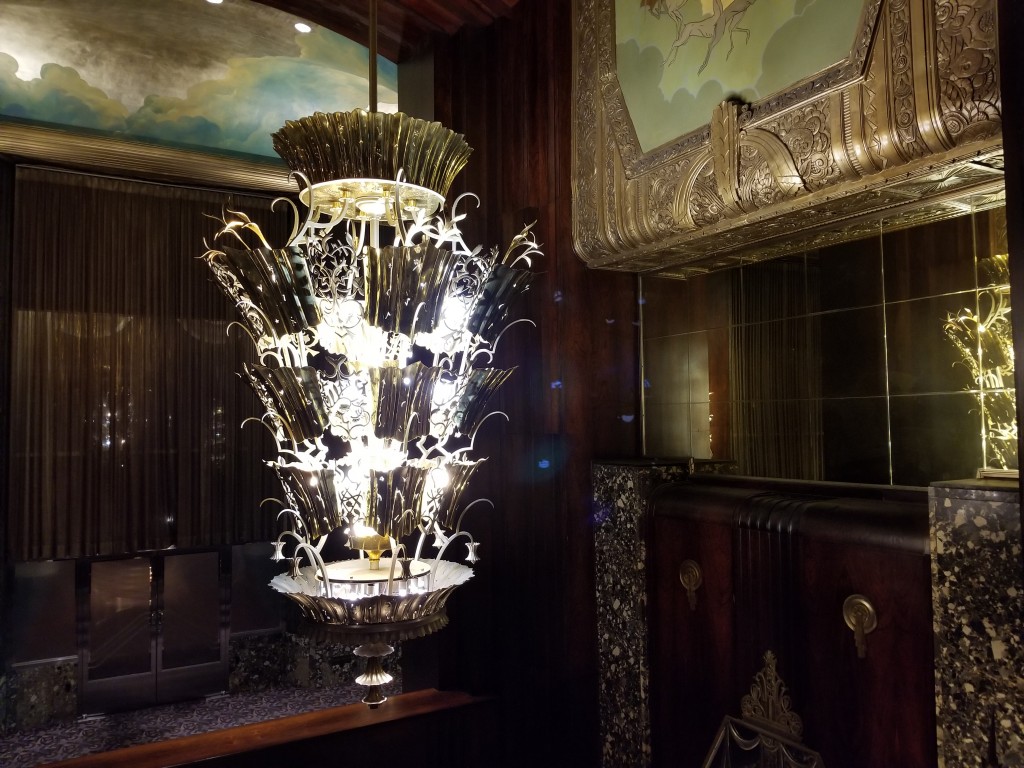2018 M-MLA Panel
October 17, 2018 in Abstracts of Conference Papers, Announcements, Midwest Modern Language Association, Uncategorized
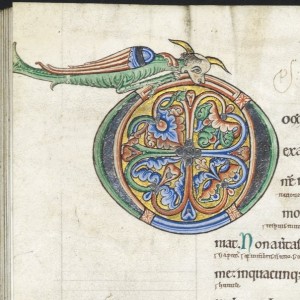
© The British Library Board. Harley MS 628, folio 160 verso, detail. Psalm 101 begins with the initial ‘d’ for ‘Domini’.
“Consuming Cultures and Manuscript Evidence”
2018 Permanent Panel
sponsored by the
Research Group on Manuscript Evidence
at the
Midwest Modern Language Association (M-MLA)
2018 Convention
Kansas City, Missouri
November 15–18, 2018
[Posted on 30 August 2018, with updates, now with a change to the Program. An earlier version of this announcement appeared as Consuming Cultures and Manuscript Evidence 2018.]
The Research Group on Manuscript Evidence, in keeping with the M-MLA’s theme of “Consuming Cultures” for its 2018 Convention, sponsors a panel on the “Consumption of Manuscripts”. After the completion of the Call for Papers, we now announce the Program for the Panel, which will take place on 15 November. The Program for the Convention in full is now available in preview through the M-MLA website: 2018 Program Booklet.
Food for Thought
In our design for the Panel, both in its proposal (as circulated in the Call for Papers) and in the selected design for its Program, we recognize that consideration of “consumption” can be literal, metaphorical, or both. For example, the process and product could mean the destruction wrought by bookworms, fires, and biblioclasts, and/or the consumption effected by textual transmission and reception more broadly.
Accordingly, we have invited all approaches, including textual, art historical, codicological, and paleographical. Also invite subjects from all periods. Nice.
Year 3 of Our Panels at the M-MLA
Thanks to the expert initiatives by our Associate Justin Hastings, this will be the 3rd year that the Research Group sponsors Permanent Panels at the Annual Convention of the Midwest Modern Language Association.
The plan to sponsor the 2018 Panels draws inspiration from the success of our Panels at the M-MLA in the past 2 years. Details here:
2017
2017 M-MLA Panel on “Artists, Activists, and Manuscript Evidence”
2017 M-MLA Panel Report
2016
“Marginalia in Manuscripts and Books” for the 2016 M-MLA
2016 M-MLA Report
As customary for our Sessions at the International Congress on Medieval Studies, we publish the Abstracts of the Papers for our Panels at the M-MLA Convention in our Panel Announcements and Reports.
*****
The continuation of the tradition of Permanent Panels at the M-MLA Convention is most welcome, and we thank our organizer, Justin Hastings, and the Midwest Modern Language Association. We congratulate Justin for his expert organizational skills and outstanding collegiality, and we applaud his willingness to continue to organize the panels for the Research Group on Manuscript Evidence.
*****
Program
Session 21. Friday 8:30–9:45 a.m.
“Consuming Cultures and Manuscript Evidence”
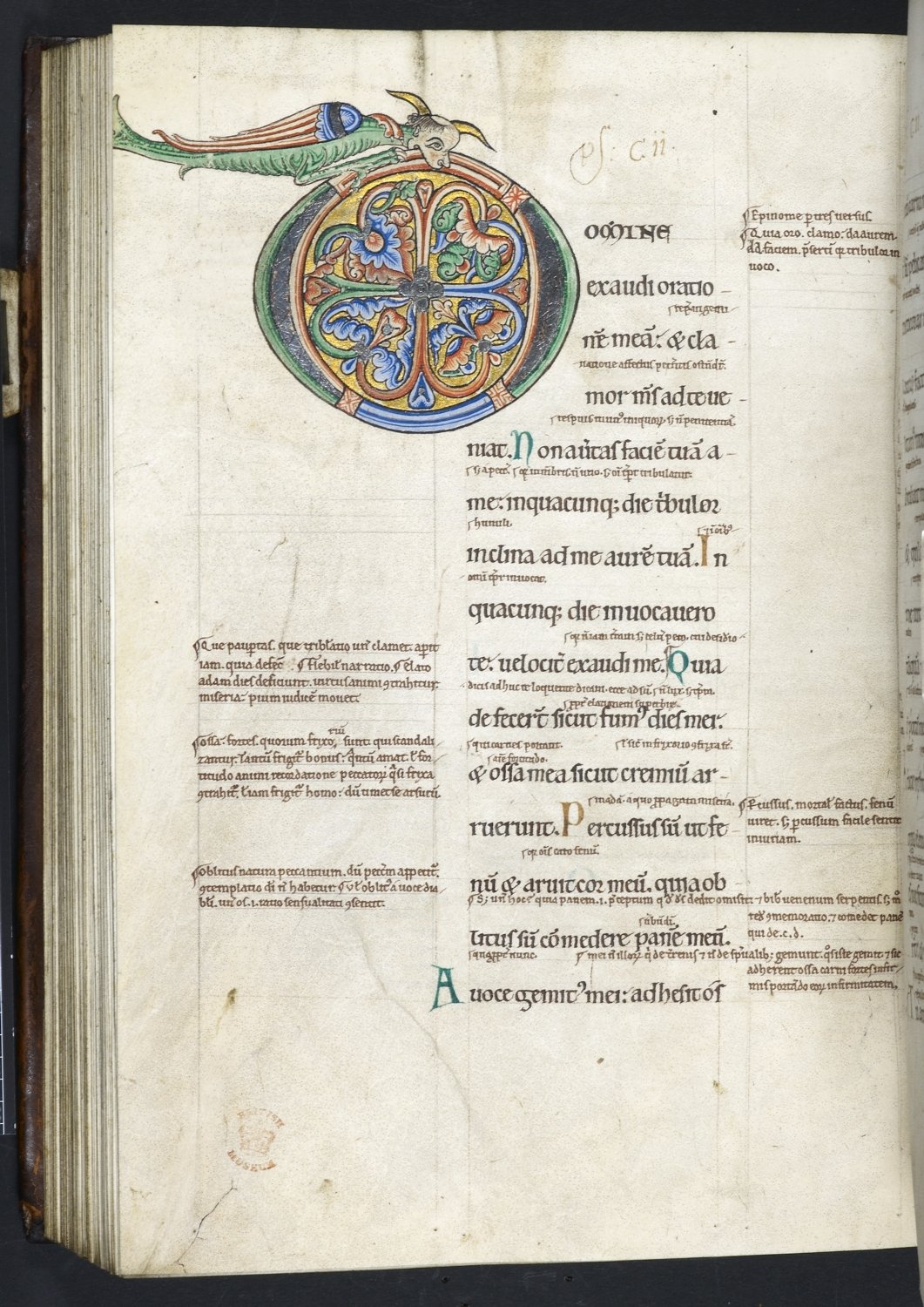
© The British Library Board. Harley MS 628, folio 160 verso. Psalms 101 begin.
Panel Sponsored by the Research Group on Manuscript Evidence
at the Midwest Modern Language Association Convention
15 November 2018
Panel Chair: Justin Hastings, Loyola University Chicago
[Note the recent change in Program, by which the paper by Jessie McDowell will be replaced by Justin’s.]
Chikako D. Kumamoto, College of DuPage, Addison, Illinois
“ ‘The Press and the Fire’ and ‘Discretion’:
Distributing Cognition and Its Reception through Paratextual Apparatus in Print and Manuscript Culture”
Two sources inspire my title.
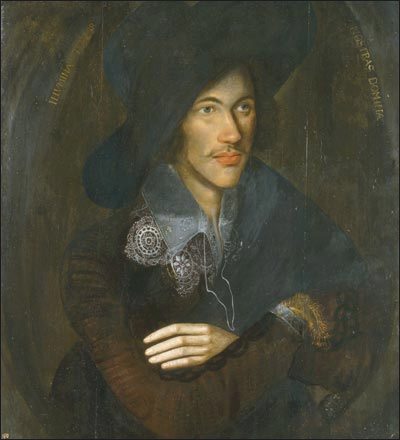
Portrait of John Donne as a young man, circa 1595. London, National Portrait Gallery, via Wikipedia Commons in the Public Domain.
Its first part comes from the letter by John Donne (1572–1631) to Robert Ker (1570? – 1650), wherein he included his manuscript of Biathanatos, while instructing Ker to “publish it not, but yet burn it not, and between those do what you will with it” (Gosse, 2:124). In this letter, Donne places his writing between the rigid visual fixity of print ([“Press”]) and the complete destruction of his words in the manuscript ([“the Fire”]), and asks Ker to use his “discretion” (“do what you will with it”) to guard against the potential misreading by readers. The second part refers to Edwin Hutchins’s 1995 study of maritime navigation, Cognition in the Wild, which argues that cognition is “always situated in a complex sociocultural world” (Hutchins, page xiii) and that “thinking and action occur as individuals mobilize a range of external resources and representations” (xii).
Viewing Donne and Hutchins at the trans-epochal threshold of cognition/knowledge-making and its distribution and reception from writer to reader, I seek to examine how Donne’s misgivings about a potential loss of his actual voice in manuscript predictively signal readers’ mental activities occurring during their print-oriented, socially-networked reading — the process to which Hutchings’s cognitive systems, composed of multiple social agents in the material world, can be applied. For both writers provoke an epistemic dialectics of textual reading as culturally-constituted, collaborative activities (writing and publishing manuscripts, and their paratextual apparatus such as title pages, prefaces, images), impacting on the reader’s thinking, knowing, and interpreting outside the writer’s manuscript culture.
By also analyzing title pages of Quarto 1 and Quarto 2 of Shakespeare’s Romeo and Juliet, I exemplify how their paratextual apparatus transmits the play’s central message which Shakespeare’s, as well as our contemporary, readers will receive collaboratively from the “discrete” dialogue between writer and reader, between a manuscript text and its paratextual apparatus.
Tentative Bibliography
Donne, John. The Life and Letters of John Donne. Ed. Edmund Gosse. 2 vols. New York: Dodd, Mead and Company, 1899; rprt. Gloucester, MA: Peter Smith, 1959.
Halio, Jay I. ed. Romeo and Juliet: Parallel Texts of Quart 1 (1597) and Quart 2 (1599). Newark: University of Delaware Press, 2008.
Hutchins, Edwin. Cognition in the Wild. Cambridge, MA, and London: MIT Press, 1995.
Shakespeare, William. The Tragedy of Romeo and Juliet. Folger Library Shakespeare. Ed. Barbara A. Mowat and Paul Werstine. New York: Washington Square Press, 1992.
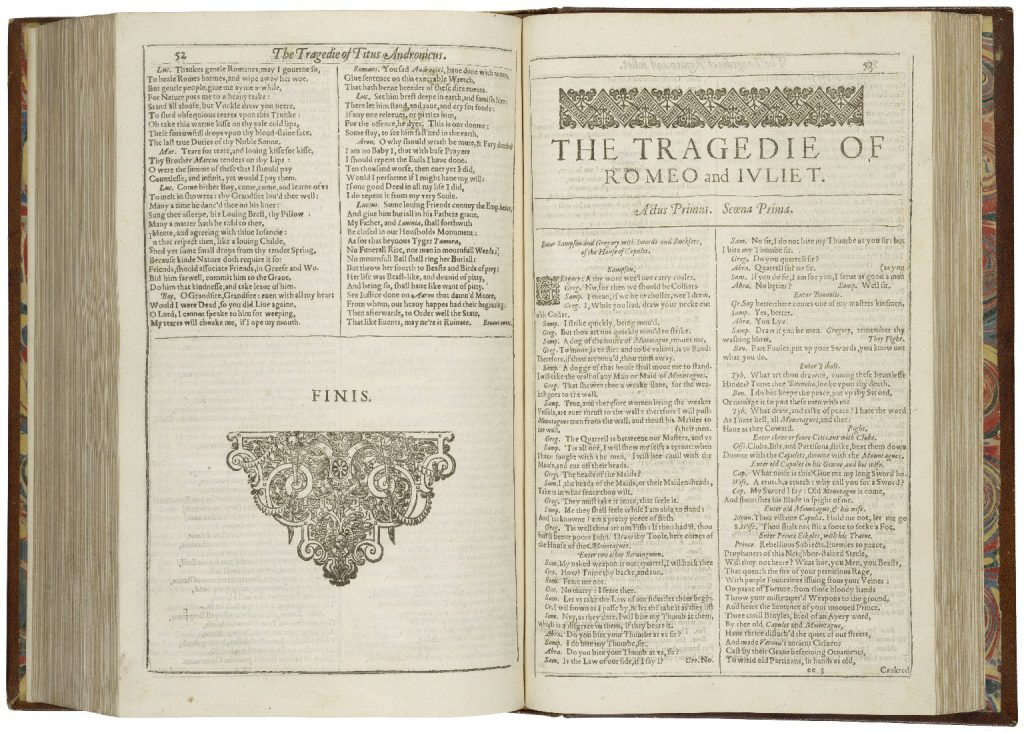
Title Page of “Romeo and Juliet” in the First Folio (1631). Folger Shakespeare Library., via Wikipedia Commons.
[This paper has been withdrawn:
Jessie McDowell, Loyola University Chicago
“Medieval Manuscripts and Interoperability:
Scholarly Editing, Collaboration, and the Digital Artisan”]
Justin Hastings, Loyola University Chicago
“Sexual Consumption and Paratextual Restraint in Lady Margaret Cavendish’s ‘The Convent of Pleasure’:
Newberry Library Case Y 135.N43”
Abstract:
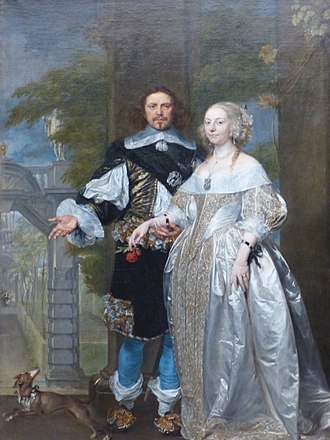
Portraits of Margaret Cavendish and her husband, William Cavendish, 1st Duke of Newcastle-upon-Tyne. Berlin, Gemäldegalerie. Oil on canvas, attributed to Gonzales Coques (between 1614 and 1618 – 18 April 1684). Image via Wikipedia Commons.
In “The Convent of Pleasure” by Margaret Cavendish (1623-1673), Duchess of Newcastle, the play’s protagonist Lady Happy, finding herself her father’s sole heir, proposes to encloister herself with “so many Noble Persons of my own Sex, as my Estate will plentifully maintain, such whose Births are greater then their Fortunes, and are resolv’d to live a single life and vow Virginity” (2.2). Lady Happy’s rationale for this is that it is impossible for a woman to be happy in marriage, since under the contemporary legal doctrine of Coverture, a wife not only surrendered her wealth to her husband, but her very selfhood was legally consumed as well.
Lady Happy, consequently, removes both herself and a coterie of similar wellborn women from a system of economic exchange in which an aristocratic women serves simply as the financial instrument by which wealth and power may pass from a hegemonic male to his heir. The fourth act of the play interrupts the otherwise subversive thrust of the play to present a reimagined fertility ritual accompanied by a pair of verse passages written by William Cavendish (1592–1676), 1st Duke of Newcastle, that serve to reinscribe the very system of aristocratic marriage that the rest of the play seeks to complicate: coats of arms are offered up as the prize for the maypole dance, and “holy Hymen’s Law” is reinstated and reinforced (4.1).
Unlike the 1662 edition of the play, the 1668 edition, as attested by Chicago, Newberry Library, Case Y 135.N43, explicitly ascribes authorship of these passages via a pair of pasted-down strips of paper imprinted with “VVritten by my Lord Duke.” Other extant copies of the 1668 edition preserve this feature along with a sequence of hand-corrections throughout the volume.
This paper will examine these and other codicological features, including an interruption in the regular quire construction at the play’s fourth act, to argue that the 1668 edition’s explicit attribution of authorship of these verse passages is tied to shifts in William Newcastle’s political fortunes and a renewed need to be seen to curb his wife’s literary aspirations, which were understood as a form of marital unchastity that diminished the Duke’s social reputation.
*****
Further information about the Convention can be found on its website. See also the M-MLA Convention Permanent Section Call for Papers .
Please Contact Us with your questions and suggestions. See you there!
For our other events, please see our News & Views”, and the reports of our activities at the annual International Congress on Medieval Studies and elsewhere.
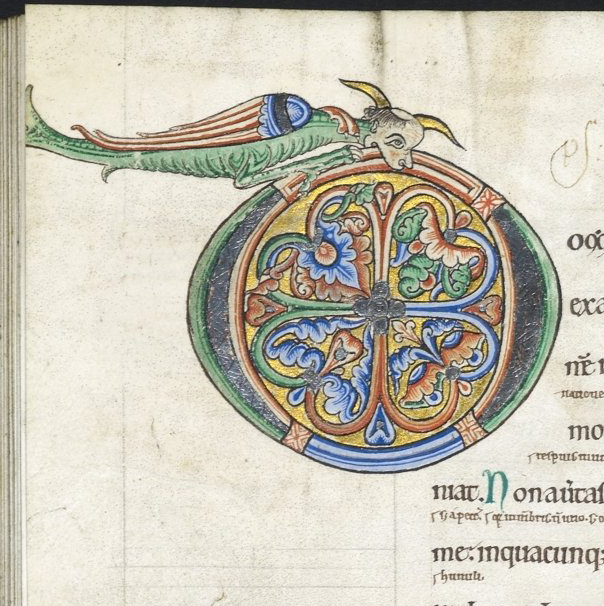
© The British Library Board. Harley MS 628, folio 160 verso, detail. Psalm 101 begins with the initial ‘d’ for ‘Domini’.
*****

